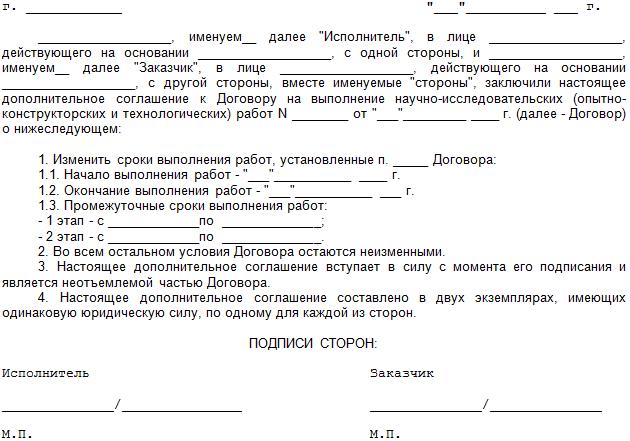Conclusion, amendment and termination of the contract - its actions by private owners. They are regulated by law and the will of the parties. How to protect your own rights without violating the rights of counterparties? This is encountered at all stages of contract work.
Legislative regulation
The main rules governing the conclusion, amendment and termination of the contract are posted in the Civil Code. There are norms of the general part, which applies to all agreements (chapter 28), and there are special provisions that apply to specific agreements.

In addition to the norms of the Civil Code, special laws apply that affect different areas of life. They impose additional requirements on the procedure for concluding, amending and terminating transactions. For example, laws on tourism, electricity, etc.
It also practices the publication of rules for the provision of services, the sale of goods that affect the procedure for concluding, amending and terminating contracts.
Some relevant laws, for example, in the field of housing and communal services, give the Government and other authorized bodies the right to issue model or model agreements.
Conclusion process
The purpose of the contract is to give new rights and obligations to its participants or to change existing ones. This is done under certain conditions, which are documented. Consider the general procedure for concluding contracts.
- contacts of the parties before the proposal to conclude an agreement;
- offer direction (offer);
- consideration of the offer and giving an acceptance (response).
The first paragraph may not apply. The offer may come in other ways: by mail, through electronic means of communication (taking into account the fixation of the shipment).
The second party has the right to send a letter to the sender indicating the desired changes in the draft contract, having drawn up a protocol of disagreements.
Proposal for conclusion
The law has some requirements for the offer.
- specificity of conditions;
- mandatory presence in the agreement of essential conditions.
The first party is considered a related offer from the moment it is received by a potential partner.
If for some reason the party that has previously proposed a transaction decides to abandon the plan, a rejection of the offer should be sent. If both the offer and the refusal are received at the same time, then only the refusal is taken into account.

Feedback is also allowed after the receipt of the offer, if this is indicated in it itself.
The offer is a finished project. For its preparation, contract forms are often used. The sender fills in the main sections, and the second side remains to enter only their data and send a copy with them back.
Acceptance
The answer implies full agreement with the proposed conditions. Silence or lack of response from a potential partner does not amount to consent, unless otherwise provided by regulatory enactments and proceeds from previous contractual relations.
The general procedure for concluding contracts implies that if, during the period given for the provision of acceptance, the second party performs the actions provided for by the offer (actual acquisition of goods or acceptance of services), the answer is considered positive unless otherwise specified in regulatory enactments or in the offer. A person who has at least partially executed a transaction is denied the right to refer in the future to the fact that an agreement has not been concluded.
If the person who sent the proposal, before receiving the acceptance or together with him receives the notice of refusal of acceptance, the contract is considered not concluded.
Terms of agreement
In practice, contract forms or samples are successfully applied.The main sections of the contract are marked on the form, the terms are formulated by the parties independently.

The sample offers ready-made conditions that are adjusted or fully accepted by the parties.
Mandatory Items
Art. 432 of the Civil Code of the Russian Federation indicates that an agreement is deemed concluded upon reaching agreement on all material terms. They are considered to be clauses which are obligatory for a specific type of contract in accordance with the legislation or the agreements of the parties.
In particular, the subject of an agreement is always considered significant. The absence of at least one of them deprives the document of power: it is considered to be not concluded and does not give rise to either rights or obligations.
A violation is the absence of a clear statement of the condition, and not just its absence.
Some contracts are concluded on conditions fully developed by the authorities. The parties can only put their signatures and details under the text. If such an agreement contains deviations from the standard text, then when considering a complaint of one of the parties in a competent authority or court, the wording from the standard conditions is taken into account. For example, a similar agreement is concluded for the export of MSW. In cases of additional regulation, the procedure for concluding, amending and terminating the contract may differ, and in each case it will be different, as we will discuss below.
Alteration
Changing the terms of the contract involves several options:
- correction of wording;
- full exclusion of points;
- addition of the contract with new paragraphs.
Amendments may affect the text of the agreement and its annexes, for example, the estimate of the contract.
Amendments are allowed by mutual agreement of the parties, unless otherwise specified in the law or the agreement itself. In particular, the reason is a significant violation of the conditions of one of the parties.
A significant change in circumstances without violations by the participants is a separate reason for the changes.

In any case, one of the parties has the right to send a proposal to change the conditions. The answer is given a certain period (if it is not set, then a period of 30 days is automatically valid). If the counterparty rejects the offer or does not respond to it, the initiator has the right to go to court.
The judge, having agreed with the statement, approves the amended conditions, which enter into force after the entry into force of the court decision, unless otherwise prescribed by regulatory enactments or new conditions.
Termination of relationship
The parties are entitled to terminate the agreement by mutual agreement. An additional agreement is signed, mutual settlements are made and that’s it.
Termination or termination unilaterally without explanation is permitted either by regulation or clause of the agreement.
In addition, cases of termination of the contract due to material violations are provided either by its terms, or by law, or other regulatory act.

Reasons for termination are also significant violations of the conditions not specified either in the legislation or in the agreement. The counterparty’s actions cause such damage that makes the continuation of the relationship is largely unprofitable.
Appeal to the court due to violations is permitted if the other party refuses to terminate the transaction. The fact of refusal or ignoring the requirement is confirmed by documents drawn up by mail or courier service. The claim is made out by the claim, it is desirable to indicate in it the time allotted to the second party for the answer.
Exceptions to the General Rules
The legislation provides for the specifics of concluding, amending and terminating contracts in a number of situations. There are not many of them.
The nuance with the obligatory conclusion of the agreement is the prohibition of the other party on the rejection of the offer. At the same time, the right remains to send a protocol of disagreements.If a lawsuit is filed with a court forcing him to conclude a contract, the court will also take into account the opinion of the other party regarding its content.
Indeed, often the reason for unwillingness to enter into a transaction is a serious distortion of conditions in favor of the provider (the person who sent the offer).

Another feature is the conclusion of an agreement with the person who won the tender or tender. The winner can only sign the documents on the proposed terms.
In the case of state or municipal contracts, which are concluded in this order, the parties still do not have the right to substantially change the conditions. In practice, it is only possible to change the deadline for the delivery of work or shipment of goods, if this does not go beyond the framework of the customer’s policy.
Even more complicated is the procedure for transactions with agricultural land. Non-compliance of the buyer with the requirements leads to the state's refusal to recognize the contract.
Everyone knows the need to coordinate transactions with guardianship authorities if the interests of children are affected.
The signing of agreements with utilities is preceded by additional procedures, for example, the coordination of technical conditions. Interaction is only with the owner or his representative by proxy. Sometimes it is allowed to participate in the transaction of persons officially living in an apartment or house, about connecting the services in question.
Notary participation
Art. 432 of the Civil Code of the Russian Federation addresses the issue of the form of expression of will of the parties. The law takes three forms:
- oral form;
- simple writing;
- conclusion of a transaction using a notary public.
He helps draw up a contract. The text is printed on a special, secure form, then, after the signatures of the parties, a notary’s signature and its seal are put.

The procedure for concluding, amending and terminating the contract requires the participation of a notary in indicating the law or agreement of the parties. If resorted to his help at the stage of imprisonment, then without it, neither change nor termination is already impossible.
State registration
Registration of transactions with real estate is a specific procedure for the parties to the transaction and officials:
- filing an application for registration of transfer of rights to property;
- verification of the contract and the documents attached to it for compliance with legislation;
- making registration entries in the register of rights.
At the stage of verification of documents, it is possible to suspend registration to eliminate deficiencies in the contract and (or) the absence of the necessary documents. Registration is refused if the applicants have not eliminated the reasons for the suspension.
Why is she paying so much attention? The moment of making an entry in the register is the moment of conclusion of the contract.
In other cases, this is the moment of signing or transferring the property, or performing other actions.
Finally
The grounds for concluding, amending and terminating the contract are the will of the parties, the terms of the agreement, the provisions of the law or other regulatory act and the court decision.
The parties fulfill the list of requirements, otherwise the contract cannot be considered concluded or it is recognized as concluded, but with serious defects. The same can be said about his change.
Termination is permitted by mutual agreement, the terms of the contract or a court decision. Before filing a claim, a claim is required.
